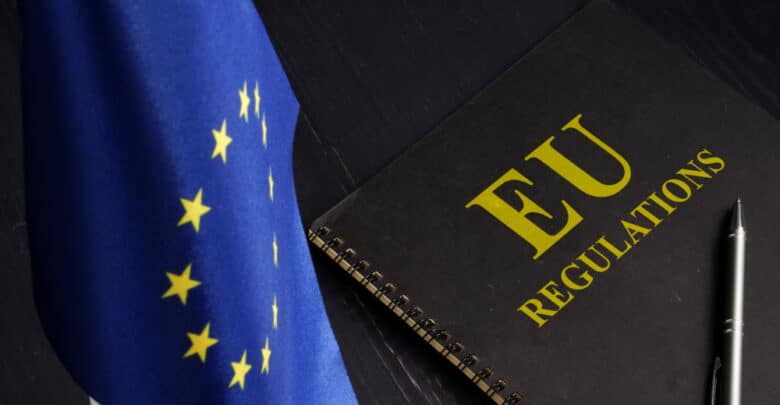EU Agreement Seeks Crypto-Specific Regulations to Safeguard Traditional Financial System

The European Union (EU) realized a political agreement to amend the Capital Requirements Regulation and Directive in a resolution to include new crypto-specific guidelines. The agreement proposes various safeguards to prevent unbacked crypto assets from infiltrating the mainstream financial system.
EU Agreement Seeks to Prevent Infiltration of Risky Crypto Assets into Mainstream Financial System
The move by the EU draws reference from the lawmakers’ calls for stricter rules to prevent the overreach of unbacked digital assets from extending tentacles to the traditional financial system. News of the agreement became public through a Tuesday, June 27 tweet through Econ Committee Press account @EP_Economics.
The Tuesday tweet by the Economic and Monetary Affairs Committee of the European Parliament lauded its negotiators for striking a deal in a round table conversation. The discussions drew representatives from the European Commission, national governments, and the European Parliament to debate the viable changes to the Capital Requirements Regulation & Directive.
Fostering Resilience in EU Banks Necessary Amidst Prudential Transition for Crypto Assets
The talks chaired by the Swedish Finance Minister Elisabeth Svantesson references the proposed rules by the European Commission in its 2021 submission. The chair who addressed the representatives on behalf of the member states observed that the proposed regulations recalibrate the risk weighting applicable to banking assets. She notes such recalibration is necessary for corporate loans to foster banks’ strength and resilience within the EU.
The European Council statement on June 27 outlined that the deal features a transitional prudential procedure for digital assets. While the statement is noncommittal on the framework, preliminary details featured a hardline stance. In particular, representatives suggested a 1250% risk weight attached to the free-floating cryptos. Adopting the hardline suggestion would obligate banks to issue euro capital equivalent to the euro of Ether and Bitcoin holdings. Approving such a suggestion would ultimately discourage banks from investing in the crypto assets ecosystem.
Breaking the Hardline as Enforcement of Adjustment Schedule for 2025
The European Commission would break the hardline by proposing an alternative stance for the regulated stablecoins. The proposal garnered support among the representatives of EU governments.
The proposed changes are anticipated for enforcement in 2025, though they require the member states approval alongside the nod needed from EU lawmakers and Council. The process would take several months to conclude.
The final text of the amended rules is scheduled to coincide with the introduction of new banking guidelines by the Basel Committee on Banking Supervision. The primary new rulebook is scheduled for implementation at the onset of 2025.
The European Parliament spokesperson observed that the representatives would wait longer before they accessed the final agreed text. Nonetheless, transitional provisions will exist until December 31, 2024, when the international Basel III will become effective on January 1, 2025.
The European Parliament spokesperson acknowledged the political agreement as laying solid ground to resolve the potential risks arising as institutions become exposed to crypto assets. The goal is to eliminate the potential risks that emerge from the absence of sufficient coverage by the current prudential framework.
Banks to Disclose Exposure to Crypto Assets
The threats posed by the crypto assets to the traditional financial ecosystem took center stage in the deliberations. The negotiators agreed that banks should prudently disclose their exposure to various crypto assets. It was agreed that the European Commission should formulate relevant legislative proposals to guide the Basel Standards developed from the ongoing undertaking by the Basel committee. The legislative proposal would suggest the prudential treatment granted to the crypto exposures during the transitional phase.
Meanwhile, the EU reached a political agreement a few days before the Markets in Crypto Assets (MiCA) rules took effect. The landmark digital assets rules are coming into force on Thursday, June 29, setting the stage for crypto firms to comply with the requirements before their enforcement strictly.
The Committee submitted that banks should mind their exposure to particular digital assets. As such, banks should avoid exceeding the 2% cap and ordinarily devote themselves to containing their exposure below 1%.
Tokenhell produces content exposure for over 5,000 crypto companies and you can be one of them too! Contact at [email protected] if you have any questions. Cryptocurrencies are highly volatile, conduct your own research before making any investment decisions. Some of the posts on this website are guest posts or paid posts that are not written by Tokenhell authors (namely Crypto Cable , Sponsored Articles and Press Release content) and the views expressed in these types of posts do not reflect the views of this website. CreditInsightHubs is not responsible for the content, accuracy, quality, advertising, products or any other content or banners (ad space) posted on the site. Read full terms and conditions / disclaimer.





